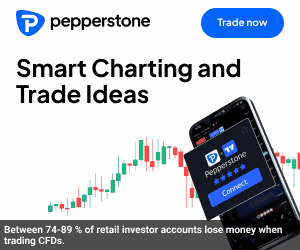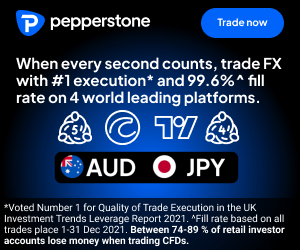CFD Trading is becoming increasingly popular due to the enormous flexibility it provides for traders and investors.
A Contract For Difference (CFD) mirrors the underlying instrument (i.e. stock, commodity) and gives you right on the price movement.
CFD Trading Brokers List
Below are some highly reputable and regulated CFD brokers that will suit both beginners and professionals.
Skilling – Best CFD Trading Broker 2022
Skilling is a Scandinavian-owned FX & CFD broker which provides trading in more than 1000 instruments including stocks, indices, FX, cryptos, and commodities.
You can trade through their proprietary platform, Skilling Trader, or through MT4 or cTrader.
🏆 Best Overall Broker 2022
✅ Up to 1:500 leverage
✅ Skilling Trader, MT4 & cTrader
✅ 900+ instruments
✅ Nordic Fintech
✅ Fast 24/5 customer support
Pepperstone – Best FX Broker 2022
Pepperstone is a highly reputable broker regulated in several tier-1 jurisdictions, including the British FCA.
With Pepperstone, you can trade 1200+ instruments through MT4, MT5, cTrader, and TradingView, at very low costs.
🏆 Best TradingView Broker 2022
✅ 1:30 | 1:400 leverage
✅ MT4, MT5 & cTrader
✅ 1200+ instruments
✅ Raw interbank spreads
✅ Fast 24/5 customer support
eToro – Best Stock Broker 2022
eToro is a multi-asset platform offering both traditional stock investing, as well as trading with CFDs in more than 4000 instruments.
eToro is highly suitable for beginners as the platform is extremely user-friendly and intuitive.
🏆 Best Investment Platform 2022
✅ 0.00% Commission
✅ Buy Real Cryptos (100+)
✅ 4000+ Assets
✅ CopyPortfolios
✅ Copy Traders Automatically
What are CFD Brokers?
CFD brokers let you trade various CFDs on underlying instruments on margin (leverage), long or short, and without the need to own the underlying asset (i.e. stock or commodity).
The margin level largely depends on which jurisdiction the broker is regulated, but most brokers regulated in the EU (including the UK), have the following margin rates for retail clients:
– 30:1 for major currency pairs
– 20:1 for non-major currency pairs, gold, and major equity indices
– 10:1 for commodities other than gold and non-major equity indices
– 5:1 for equities
– 2:1 for cryptocurrencies
Offshore brokers have no such limitation on leverage and you can usually use leverage up to 1:500.
Cost & Fees
CFD brokers usually charge you a markup on the spread on the underlying instrument.
The spread cost is usually two-folded:
- The natural market spread in that instrument
- The spread markup from the broker
The total is the spread you see on your trading platform.
In addition, since you are trading on margin and “borrowing” money from the broker, you must pay a financing cost if you decide to hold a position overnight.
Conclusion
CFD Trading brokers let you trade CFDs on underlying assets such as stocks, commodities, indices, crypto, and FX.
When trading CFDs, you trade on leverage which can magnify profits as well as losses.
The majority of retail clients who trade CFDs on margin lose money.





